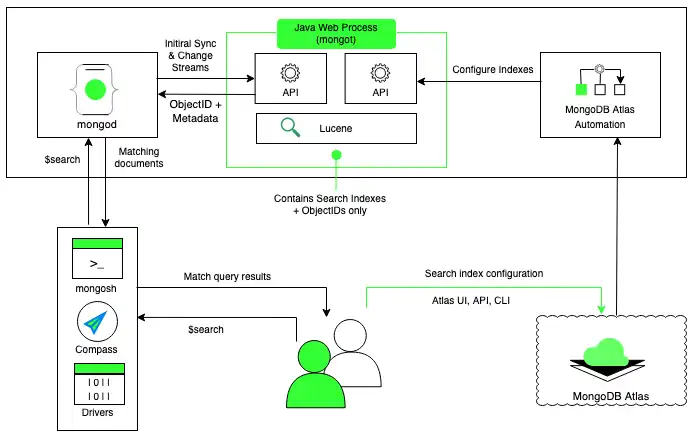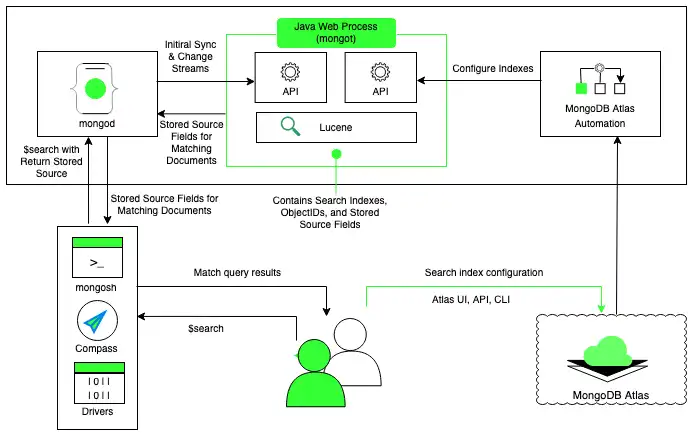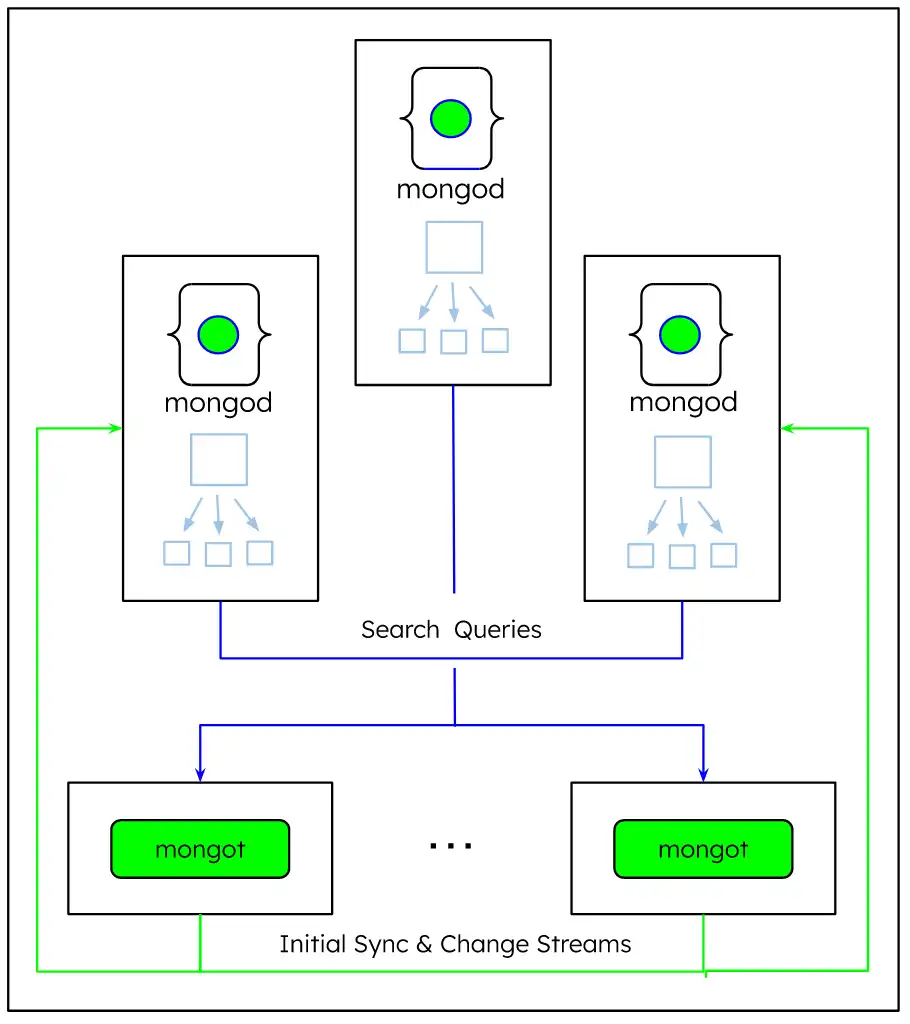Docs Home → Launch & Manage MongoDB → MongoDB Atlas
Atlas Search Overview
On this page
MongoDB's Atlas Search allows fine-grained text indexing and querying of data
on your Atlas cluster. It enables advanced search functionality for
your applications without any additional management or separate search
system alongside your database. Atlas Search provides options for several
kinds of text analyzers, a rich query
language that uses Atlas Search aggregation pipeline
stages like $search and $searchMeta in
conjunction with other MongoDB aggregation pipeline stages, and
score-based results ranking.
Tip
Quickly try Atlas Search without needing an Atlas account, cluster, or collection, with the Atlas Search Playground. To learn more, see the documentation.
Atlas Search is available on Atlas instances running MongoDB 4.2 or higher versions only. For certain features, Atlas Search might require a specific version of MongoDB. The following table lists the Atlas Search features that require specific MongoDB versions.
Atlas Search Feature | MongoDB Version for Feature |
|---|---|
5.0.4+, 6.0+, 7.0+ | |
6.0+, 7.0+ | |
5.0.6+, 6.0+, 7.0+ | |
5.0+ | |
6.0+, 7.0+ | |
6.0+, 7.0+ | |
5.0+, 6.0+, 7.0+ | |
6.0+, 7.0+ | |
6.0+, 7.0+ | |
6.0+, 7.0+ | |
Atlas Search local deployment with the Atlas CLI | 6.0+, 7.0+ |
6.0.13+, 7.0.5+ |
Atlas Search is not supported for time series collections.
Atlas Search Architecture
The Atlas Search mongot process uses Apache Lucene and runs alongside mongod on each
node in the Atlas cluster. The mongot process:
Creates Atlas Search indexes based on the rules in the index definition for the collection.
Monitors change streams for the current state of the documents and index changes for the collections for which you defined Atlas Search indexes.
Processes Atlas Search queries and returns matching documents.

Stored Source Architecture
If you define stored source
fields in your Atlas Search index, the mongot process stores the
specified fields and, for matching documents, returns the stored fields
directly from mongot instead of doing a full document lookup on the
database if you specify the returnStoredSource Option in your query.

Search Nodes Architecture
For dedicated (M10 or higher) sharded and unsharded Atlas
clusters on AWS or Google Cloud, you can deploy separate Search Nodes that run
only the mongot process for workload isolation. Atlas
deploys Search Nodes with each cluster or with each shard on the
cluster. For example, if you deploy 2 Search Nodes for a cluster
with 3 shards, Atlas deploys 6 Search Nodes, 2 per shard.
Deploying separate Search Nodes provides the following benefits:
Scales storage independent of MongoDB cluster.
Scales query load independent of MongoDB.
When you deploy separate Search Nodes, the mongot processes run on
separate Search Nodes that you can configure independently.

You can configure Search Nodes to run the mongot process separately
from the database nodes that run the mongod process on your
Atlas cluster. You can also configure the number of Search Nodes
and the amount of resources provisioned for each search node.
You can configure Search Nodes for only single-region AWS or Google Cloud clusters. You can't deploy Search Nodes separately for serverless or multi-cloud clusters. To learn more about deploying Search Nodes separately, see Search Nodes for Workload Isolation. To deploy the Search Nodes from the UI or API, see Create a Cluster.
When you deploy separate Search Nodes, Atlas automatically assigns a
mongod for each mongot. The mongot communicates with
the mongod to listen for and sync index changes for the indexes that
it stores.
If you delete all the Search Nodes on your cluster, there will be a
brief interruption in processing your search query results. To learn
more, see Modify a Cluster. If you
delete your Atlas cluster, Atlas pauses and then deletes
all associated Atlas Search deployments (mongot processes).
Note
The local SSDs used for Search Nodes require a 20% storage overhead to support index operations.
Atlas Search Indexes
Atlas Search index is a data structure that categorizes data in an easily searchable format. It is a mapping between terms and the documents that contain those terms. Atlas Search indexes enable faster retrieval of documents using certain identifiers. You must configure an Atlas Search index to query data in your Atlas cluster using Atlas Search.
You can create an Atlas Search index on a single field or on multiple fields. We recommend that you index the fields that you regularly use to sort or filter your data in order to quickly retrieve the documents that contain the relevant data at query-time.
When you configure one or more Atlas Search indexes, Atlas enables the
mongot process on the nodes in the cluster. Each mongot process
talks to the mongod on the same node. To create and update search
indexes, the mongot process performs collection scans on the
backend database and opens change streams for each index.
You can specify the fields to index using the following methods:
Dynamic mappings, which enables Atlas Search to automatically index all the fields of supported types in each document. This takes disk space and might negatively impact cluster performance.
Static mappings, which allows you to selectively identify the fields to index. If fields contain polymorphic data, Atlas Search indexes only documents that correspond to the mapping in the index definition and ignores documents that contain values that don't correspond to the mapping specified in the index definition for the fields.
Atlas Search performs inverted indexing and stores the indexed fields on disk.
An inverted index is a mapping between terms and which documents contain
those terms. Atlas Search indexes contain the term, the _id, and other
relevant metadata about the term, such as the position of the term, in
the document.
Although the data stored on Atlas Search isn't an identical copy of data from
the collection on your Atlas cluster, Atlas Search indexes still take some
disk space and memory. If you enable the store option for fields
that contain string values or if you configure
the stored source fields in your
index, Atlas Search stores an identical copy of the specified fields on disk,
which can take disk space.
Atlas Search provides built-in analyzers for creating indexable terms that correct for differences in punctuation, capitalization, stop words, and more. Analyzers apply parsing and language rules to the query. You can also create a custom analyzer using available built-in character filters, tokenizers, and token filters. To learn more about the built-in and custom analyzers, see Process Data with Analyzers.
For text fields, the mongot performs the following tasks to analyze
text and create indexable tokens:
Tokenization, which is breaking up of words in a string to indexable tokens
Normalization, such as transforming the text to lower case, folding diacritics, and removing stop words
Stemming, such as ignoring plural and other word forms to index the word in the most reduced form
To learn more about Atlas Search support for other data types, see
Data Types. The mongot
process stores the indexed fields and the _id field on disk per
index for the collections on the cluster.
If you change an existing index, Atlas Search rebuilds the index without downtime. This allows you to continue using the old index for existing and new queries until the index rebuilding is complete.
If you make changes to the collection for which you defined Atlas Search
indexes, the latest data might not be available immediately for
queries. However, mongot monitors the change streams, which allows
it to update stored copies of data, and Atlas Search indexes are eventually
consistent.
Note
For Dedicated Search Nodes
Adding and adjusting shards triggers a rebuild of the Atlas Search index. During this index rebuild, the index might not have the most current data. Therefore, queries against data on the those shards might fail or return incorrect results.
If you reshard a collection with Atlas Search indexes, Atlas Search indexes on the collection become unavailable when the resharding operation completes. You must rebuild your Atlas Search indexes once the resharding operation completes.
Note
Atlas Search doesn't support encrypting Atlas Search indexes with encryption keys using Customer Key Management in the Atlas UI.
Tip
See also: Learn by Watching
Watch this video for an overview of Atlas Search indexes. In this video, you can learn more about analyzers and Atlas Search autocomplete field type.
Duration: 8 Minutes
After you set up an Atlas Search index for a collection, you can run queries against the indexed fields.
Atlas Search Queries
Atlas Search queries take the form of an aggregation pipeline stage. Atlas Search provides $search and
$searchMeta stages, both of which must be the first stage
in the query pipeline. These stages can be used in conjunction with
other aggregation pipeline stages in your
query pipeline. To learn more about these pipeline stages, see
Choose the Aggregation Pipeline Stage.
Atlas Search also provides query operators and
collectors that you can use inside the
$search and $searchMeta aggregation
pipeline stages. The Atlas Search operators allow you to
locate and retrieve matching data from the collection on your Atlas
cluster. The collector returns a document representing the search
metadata results.
You can use Atlas Search operators to query terms, phrases, geographic shapes
and points, numeric values, similar documents, synonymous terms, and more.
You can also search using regex and wildcard expressions. The Atlas Search
compound operator allows you to combine multiple operators
inside your $search stage to perform a complex search and
filter of data based on what must, must not, or should be present
in the documents returned by Atlas Search. You can use the compound
operator to also match or filter documents in the $search
stage itself. Running $match after $search is
less performant than running $search with the
compound operator.
To learn more about the syntax, options, and usage of the Atlas Search operators, see Use Operators and Collectors in Atlas Search Queries.
When you run a query, Atlas Search uses the configured read preference to identify the node on which to run the query.
The query first goes to the MongoDB process, which is mongod for a
replica set cluster or mongos for a sharded cluster. For sharded
clusters, your cluster data is partitioned across mongod instances
and each mongot knows about the data on the mongod on the same
node only. Therefore, you can't run queries that target a particular
shard. mongos directs the queries to all shards, making these
scatter gather queries. If you use zones to distribute a sharded collection over a subset
of the shards in the cluster, Atlas Search routes the query to the zone
that contains the shards for the collection that you are querying and
runs your $search queries on just the shards where the
collection is located.
The MongoDB process routes the query to the mongot on the same
node. Atlas Search performs the search and scoring and returns the document
IDs and other search metadata for the matching results to mongod.
The mongod then performs a full document lookup implicitly for the
matching results and returns the results to the client.
Note
For Dedicated Search Nodes
When you run a query, the query first goes to the MongoDB process
based on the configured read preference.
The mongod process routes the search query through a load
balancer on the same node, which distributes the requests across all
of the mongot processes. The Atlas Search mongot process performs
the search and scoring and returns the matching results to
mongod, which mongod then returns to the client. If you use
the $search concurrent option in
your query, Atlas Search enables intra-query parallelism. To learn more, see
Parallelize Query Execution Across Segments.
Atlas Search associates a relevance-based score with every document in the result set. The relevance-based scoring allows Atlas Search to return documents in the order from the highest score to the lowest. Atlas Search scores documents higher if the query term appears frequently in a document and lower if the query term appears across many documents in the collection. Atlas Search also supports customizing the relevance-based default score by boosting, decaying, or other modifying options. To learn more about customizing the resulting scores, see Score the Documents in the Results.
Search Nodes Cost
MongoDB supports separate Search Nodes on single-region AWS or Google Cloud
dedicated (M10 or higher) clusters only. Search nodes are deployed on
compute-intensive NVMe instances. You must deploy a minimum of
two nodes. You will be billed daily for hourly resource usage per node.
To learn more, see Search Node Costs.
Next Steps
For hands-on experience creating Atlas Search indexes and running Atlas Search queries against the sample datasets, try the tutorials in the following pages:
Prefer to learn by watching?
Watch an overview of Atlas and Atlas Search and get started setting up Atlas Search for your data. The video demonstrates how to load sample data on your cluster, create an Atlas Search index, and run a sample query using Search Tester and Data Explorer.
Duration: 10 Minutes